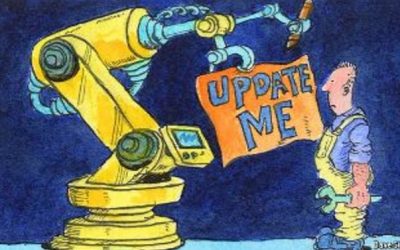People are dying because there is a lack of innovation in the health industry. This is because technologies like AI and machine learning are opening up significant opportunities in patient care, but, for a variety of reasons, the healthcare industry is slow to take up these innovations.
 This the topic explored by Mariya Yao in an article titled: The opportunities and challenges of AI in health care. It was published on Venture Beat.
This the topic explored by Mariya Yao in an article titled: The opportunities and challenges of AI in health care. It was published on Venture Beat.
The impact of machine learning and AI will be significant in many industries but, according to Yao, venture capitalists believe more potential for this technology exists in healthcare than in any other industry.
Opportunities
· Exponential advances in health care through AI in areas such as the accuracy of diagnosis, the quality of medical records, drug development, and more. There are already algorithms that are better at diagnosing certain diseases than experienced doctors. In fact, AI means it might one day be possible to eliminate most (or all) disease.
· Make up the expected shortfall that is expected over the next 10 years in the numbers of primary care physicians available.
· Help deal with the aging population.
· Help patients stay healthy and follow the recommended course of action prescribed by their doctor – for example, by ensuring they take their medication and don’t miss any doses.
· improve the development of drugs and reduce the risks associated with their development.
· improve the security of medical records.
The Challenges
These opportunities cannot be realised, however, until everyone involved in the implementation of AI and machine learning technology deals with the challenges that exist.
The biggest challenge is doing nothing. This is often the approach of the healthcare industry because of an aversion to risk, i.e. people who advocate a slow take-up of innovation do this because they believe they are protecting patients. In reality they are probably harming patients because they’re resisting the innovation that could – and would – lead to better health care provision.
In addition, this conservative approach to implementing new technology in the health industry makes the development of new healthcare technologies unattractive. Start-ups, innovators, and entrepreneurs therefore choose to focus their energies (and money) in sectors and industries that allow for a faster route to profitability.
Other challenges to the widespread adoption of AI and machine learning in healthcare include:
· Issues with the quality of data and having access to sufficient reliable datasets
· Problems with implementation and integration, particularly as the industry is often very set it is ways
· Bad experiences with technology implementation in the past makes healthcare professionals reluctant to move too quickly
There is a way forward providing the following three points are considered with appropriate action taken:
· Both those in the industry and those developing the technology must understand and work to overcome the challenges.
· They should do this because the benefits to the wider population will be significant if they are successful. In fact, the general health of everyone should dramatically improve.
· Collaboration is crucial between everyone involved including investors, developers and entrepreneurs as well as regulators, healthcare providers, practitioners, and patients.
Big Data and related technologies – from data warehousing to analytics and business intelligence (BI) – are transforming the business world. Big Data is not simply big: Gartner defines it as “high-volume, high-velocity and high-variety information assets.” Managing these assets to generate the fourth “V” – value – is a challenge. Many excellent solutions are on the market, but they must be matched to specific needs. At GRT Corporation our focus is on providing value to the business customer.
Digital Transformation for Power Plant
Picture by Timothy Cheng, GE Reports Power system equipment condition monitoring is a must if you wish to ensure the...



